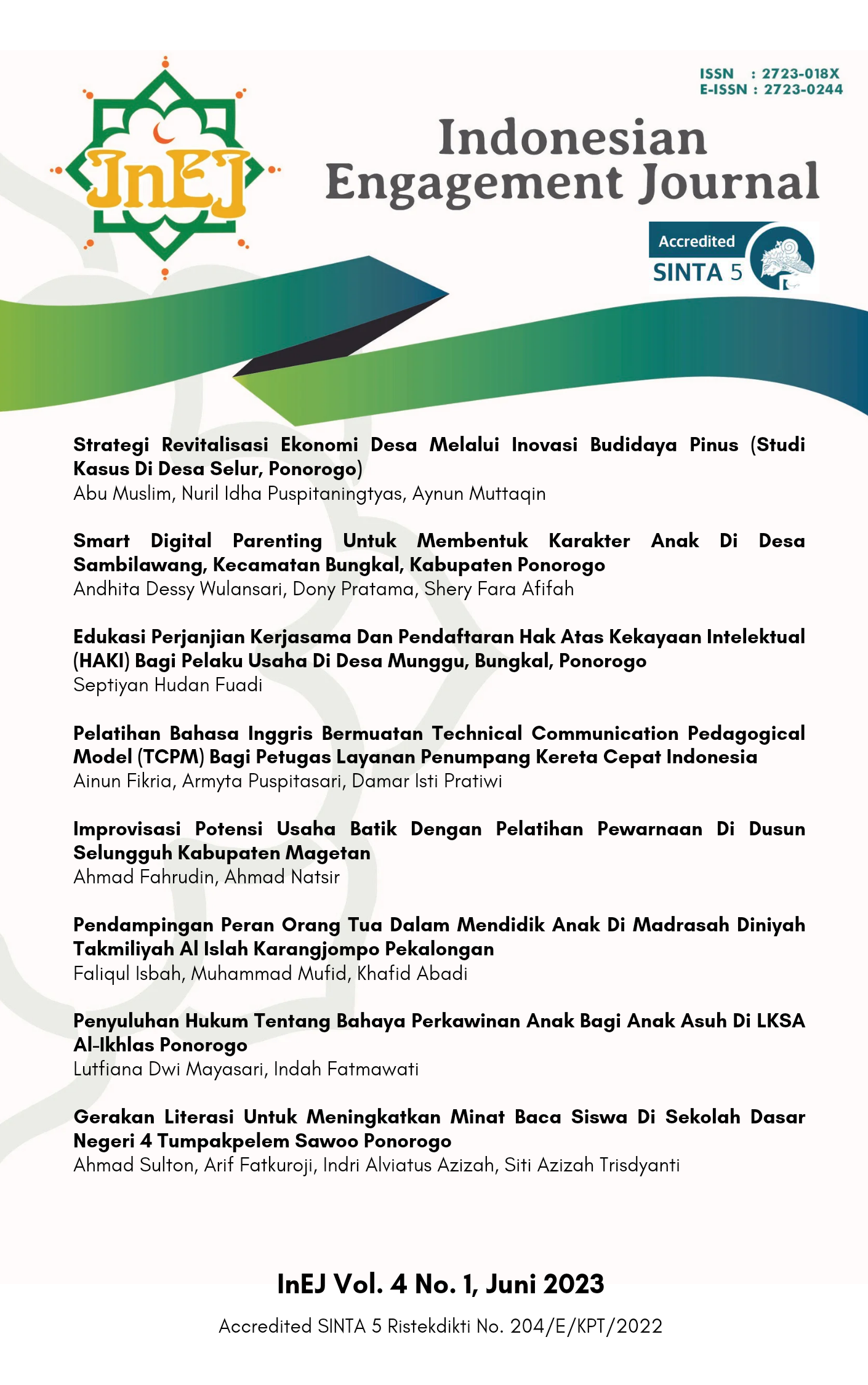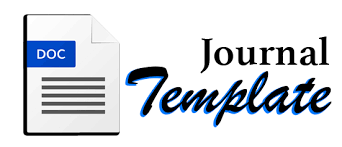ACCELERATION OF IMPLEMENTATION AND ACHIEVEMENT OF STANDARDS MINIMUM SERVICE (PRIME SERVICE) BASED ON EVALUATION IN PONOROGO DISTRICT GOVERNMENT
DOI:
https://doi.org/10.21154/inej.v4i1.7242Keywords:
Engag Evaluation, Achievement, Excellent Service.Abstract
Kerjasama antara Lembaga Penelitian dan Pengabdian Masyarakat (LPPM) IAIN Ponorogo dengan Pemerintah Kabupaten Ponorogo dalam menyelesaikan Program Kajian Evaluasi Percepatan Penerapan dan Pencapaian Standart Pelayanan Minimal (Layanan Prima) di Kabupaten Ponorogo. Evaluasi ini merupakan kajian yang bersifat public needs evaluation (evaluasi terhadap kebutuhan publik) yang mendasarkan diri pada 2 pendekatan sekaligus (mixed methods), yaitu metode kuantitatif dan kualitatif, yang pada akhirnya diharapkan dapat menggali data secara komprehensif serta memberikan kontribusi yang signifikan berupa rekomendasi kebijakan bagi pengembangan program publik di Kabupaten Ponorogo, instrumen yang digunakan dalam penelitian ini berupa wawancara, observasi, dokumentasi serta kuesioner yang dikembangkan berdasarkan pada 4 (empat) macam informasi utama. Hasil evaluasi terhadap pelaksanaan pelayanan prima pada Satuan Kerja (Satker) di lingkungan Pemerintah Kabupaten Ponorogo yang terdiri dari Satker Dinas Kependudukan dan Catatan Sipil (Disukcapil), Dinas Pendidikan (Disdik), Dinas Perhubungan (Dishub), Dinas Kesehatan (Dinkes), serta Dinas Sosial, Tenaga Kerja dan Transmigrasi (Disnakertrans) yang mencakup 3 bahasan utama yaitu: (1). Kualitas kinerja satuan kerja (satker/unit) pelayanan prima di lingkungan Pemerintah Kabupaten Ponorogo berbasis penilaian standar ISO 9001:2008; (2). Tingkat kepuasan publik (pengguna) terhadap pelaksanaan layanan prima di lingkungan satuan kerja Pemerintah Kebupaten Ponorogo; serta (3) Pengaruh kualitas layanan prima terhadap tingkat kepuasan publik (pengguna) di lingkungan satuan kerja Pemerintah Kabupaten Ponorogo.References
Anas Salman Alabboodi, “The Effect of Customer Satisfaction on Service Quality: The Case of Iraqi Banks,” International Journal of Applied Research 5, no. 1 (2019): 146”“52.
Arif Wicaksana and Tahar Rachman, “Analisis Kritis Terhadap Kebijakan Standar Kompetensi Pendidik Dan Tenaga Kependidikan Di Lembaga Pendidikan Islam Swasta,” Angewandte Chemie International Edition, 6(11), 951”“952. 3, no. 1 (2018): 10”“27, https://medium.com/@arifwicaksanaa/pengertian-use-case-a7e576e1b6bf.
Emma Dwi Ariyani, “Penerapan Pelayanan Prima Sebagai Upaya Meningkatkan Kepuasan Pelanggan Di Politeknik Manufaktur Negeri Bandung,” Jurnal Ilmu Administrasi: Media Pengembangan Ilmu Dan Praktek Administrasi 7, no. 1 (2010): 3.
Einjelheart Hansiden Polii, “Evaluation of Governance Implementation Minahasa Regency Drinking Water Company,” International Journal of Social Science and Human Research 04, no. 06 (2021): 1405”“13, https://doi.org/10.47191/ijsshr/v4-i6-25.
Fery Diantoro, “Realisasi Program Jimpitan Karang Taruna Bugis Generation Dalam Meningkatkan Peran Sosial” 1, no. 2 (2020). 165.
Fitri Meldawati, Sulaiman Sulaiman, and A. Muhyani Rizalie, “Strategies for Quality Improvement of School Administration Staff Performance: A Multi-Site Study at PGRI 1 Martapura Vocational School and PGRI Banjarbaru Vocational School,” International Journal of Social Science And Human Research 06, no. 01 (2023): 343”“48, https://doi.org/10.47191/ijsshr/v6-i1-47.
Ktut Arte Wardane, Wahyu Wahyu, and Suhaimi Suhaimi, “Implementation of Fun School Management at SMKN 3 and SMKN 2 Kuala Kapuas,” International Journal of Social Science and Human Research 06, no. 06 (2023): 3505”“10, https://doi.org/10.47191/ijsshr/v6-i6-36.
Minnah El Widdah, “Learning Strategies in Early Childhood Language Development during the Covid-19 Pandemic,” International Journal of Social Science and Human Research 04, no. 04 (2021): 613”“20, https://doi.org/10.47191/ijsshr/v4-i4-08.
Osborne David and Gaebler Ted, “Reinventing Government: How the Entrepreneurial Spirit Is Transforming the Public Sector” (Prentice Hall of India, 1992).
Sukron Ma’mun, “Peranan Aparatur Yang Profesional Guna Mewujudkan Pelayanan Prima Dalam Birokrasi,” Aspirasi: Jurnal Ilmiah Administrasi Negara 1, no. 1 (2016): 15”“26.
Umar Faruq. “Pendampingan Transformasi Metode Pemasaran Umkm Desa Crabak Dari Tradisional Ke Digital” Crabak Dari, Tradisional Ke, And Iain Ponorogo, 3, no. 2 (2022): 1”“23.
Y D Mahendra, “Manajemen Strategi Pembelajaran Al-Qur’an Metode Ummi (Studi Analisis Di Madrasah Diniyah AlIhsanPonorogo),”2022,http://etheses.iainponorogo.ac.id.
Yusril D W I Mahendra et al., “International Journal of Social Science And Human Research Management of Student Character Education in the Globalization Era ( Case Study in Wali Songo Islamic Boarding School Ngabar Ponorogo )” 06, no. 08 (2023): 5169”“76, https://doi.org/10.47191/ijsshr/v6-i8-73.
Downloads
Additional Files
Published
Issue
Section
License
Please find the rights and licenses in InEJ. By submitting the article/manuscript of the article, the author(s) agree with this policy. No specific document sign-off is required.1. License
The non-commercial use of the article will be governed by the Creative Commons Attribution license as currently displayed on Creative Commons Attribution-NonCommercial-ShareAlike 4.0 International License.
2. Author(s)' Warranties
The author warrants that the article is original, written by stated author(s), has not been published before, contains no unlawful statements, does not infringe the rights of others, is subject to copyright that is vested exclusively in the author and free of any third party rights, and that any necessary written permissions to quote from other sources have been obtained by the author(s).
3. User/Public Rights
The spirit of InEJ is to disseminate articles published are as free as possible. Under the Creative Commons license, InEJ permits users to copy, distribute, display, and perform the work for non-commercial purposes only. Users will also need to attribute authors and InEJ on distributing works in the journal and other media of publications. Unless otherwise stated, the authors are public entities as soon as their articles got published.
4. Rights of Authors
Authors retain all their rights to the published works, such as (but not limited to) the following rights;
Copyright and other proprietary rights relating to the article, such as patent rights,
The right to use the substance of the article in own future works, including lectures and books,
The right to reproduce the article for own purposes,
The right to self-archive the article,
The right to enter into separate, additional contractual arrangements for the non-exclusive distribution of the article's published version (e.g., post it to an institutional repository or publish it in a book), with an acknowledgment of its initial publication in this journal (InEJ: Indonesian Engagement Journal).
5. Co-Authorship
If the article was jointly prepared by more than one author, any authors submitting the manuscript warrants that he/she has been authorized by all co-authors to be agreed on this copyright and license notice (agreement) on their behalf, and agrees to inform his/her co-authors of the terms of this policy. InEJ will not be held liable for anything that may arise due to the author(s) internal dispute. InEJ will only communicate with the corresponding author.
6. Royalties
Being an open accessed journal and disseminating articles for free under the Creative Commons license term mentioned, author(s) aware that InEJ entitles the author(s) to no royalties or other fees.
7. Miscellaneous
InEJ will publish the article (or have it published) in the journal if the article’s editorial process is successfully completed. The editors of Journal may modify the article to a style of punctuation, spelling, capitalization, referencing and usage that deems appropriate. The author acknowledges that the article may be published so that it will be publicly accessible and such access will be free of charge for the readers as mentioned in point 3.




